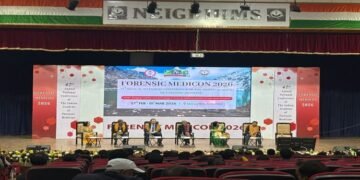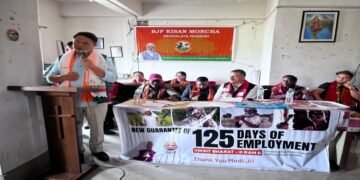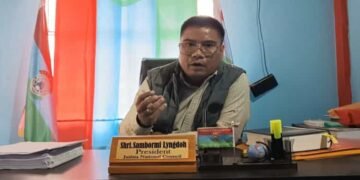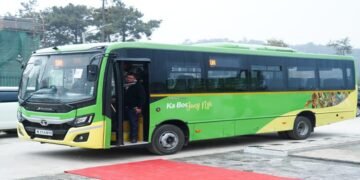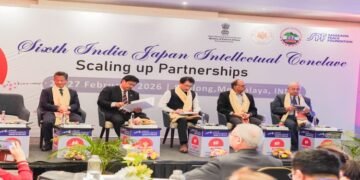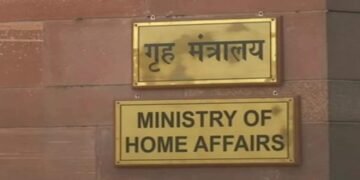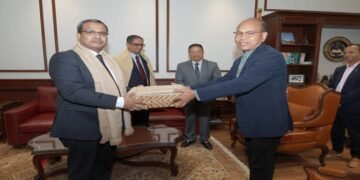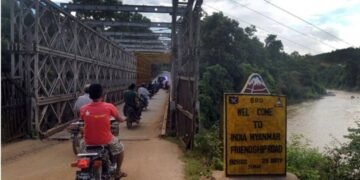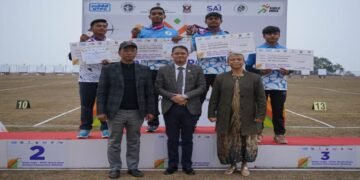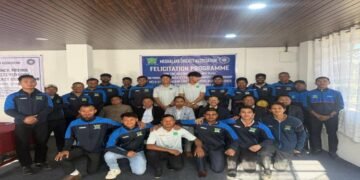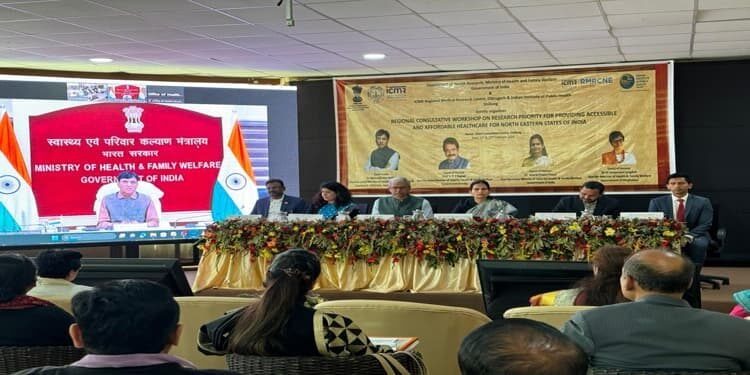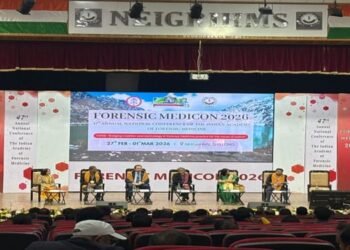Shillong (Meghalaya), Feb 21 : Marking a significant milestone in advancing healthcare education and research in India, the Union Minister of Health & Family Welfare, Dr. Mansukh L. Mandaviya today officially inaugurated the two-day “Regional Consultative Workshop on Research Priority for Ensuring Accessible and Affordable Healthcare in the Northeastern States of India”. The event also marked the inauguration of the Master’s program in Health Economics and Technology Assessment- IIPH Shillong.
Organized by the Department of Health Research, Government of India, in collaboration with the Indian Institute of Public Health, Shillong, and the Regional Medical Research Centre, Dibrugarh, under the Indian Council of Medical Research (ICMR), a regional consultative workshop was held on February 21, 2024 at the State Convention Centre, Shillong. The workshop aimed to identify research priorities for enhancing accessible and affordable healthcare in the North East States of India. The workshop witnessed the coming together of Principal Secretaries from eight Northeast Indian States, along with the officials of DHR, ICMR, among others.
Addressing the gathering virtually, Dr Mandaviya echoed Prime Minister’s Narendra Modi’s dream of creating a healthy and a developed India, in which every citizen of the country receive quality health facilities on time; health facilities and medicines should become easily affordable, accessible and available; and health facilities should be spread across all areas irrespective of geographical barriers, transcending all borders”. He said that the effort of the government is on ensuring that everyone gets access to health facilities in an equitable manner without any discrimination between rich and poor. To achieve this objective, the government has formulated several policies and schemes due to which India has created a health model that gives meaning to the spirit of ‘Sarvajan Hitay, Sarvajan Sukhaay’”.
Speaking about the Union Government’s dedicated efforts towards the progress of the Northeastern region, Dr. Mandaviya stated, “Over the past decade, concerted efforts have been made to integrate the region into the national mainstream by enhancing connectivity across various fronts such as healthcare, transportation, telecommunications, waterways, and aerial tramways. This marks the first instance in our nation’s history where the Northeast region is recognized as India’s growth catalyst”. He continued, “In the last decade, significant advancements have been made, including the establishment of institutions like RIMS (Regional Institute of Medical Sciences), RIPANS (Regional Institute of Paramedical and Nursing Sciences), NEIGRIHMS (Northeastern Indira Gandhi Regional Institute of Health and Medical Sciences), and the introduction of Assam AIIMS (All India Institute of Medical Sciences), along with the inauguration of 23 new medical colleges. Additionally, the Indian Council of Medical Research (ICMR) has also spearheaded the development of various healthcare facilities in the region.”
During her address, Dr. Bharati Pravin Pawar, Minister of State for the Ministry of Health and Family Welfare , emphasized the government’s focus on promoting wellness rather than merely treating illness, leveraging the power of technology. She highlighted the importance of innovative programs at the state level, emphasizing the potential impact of pilot projects in driving healthcare innovation.
The Guest of Honour, Dr. M. Ampareen Lyngdoh, the Health Minister of Meghalaya, highlighted the significant developments in NEIGRIHMS, particularly the accelerated progress in the Radiology department following the visit of Dr. Bharati Pravin Pawar, the Hon’ble Minister of State for the Ministry of Health and Family Welfare (MOHFW) to the State. In addressing the healthcare challenges faced by Meghalaya, Dr. Lyngdoh highlighted issues such as high infant and maternal mortality rates and the prevalence of non-communicable diseases like hypertension and mental health disorders for which research plays a crucial role in coming up with informed and effective policies and strategies. She particularly emphasized the need for comprehensive research to address these challenges effectively, and hence the importance of such a workshop.
She further stated, “Our state is actively addressing drug-related issues, the increasing prevalence of HIV/AIDS, cancer, and kidney disorders. It is imperative to highlight the significance of our ongoing initiatives, including those spearheaded by the State government under the leadership of the Chief Minister, all geared towards enhancing healthcare delivery”.
Meanwhile, Meghalaya’s Principal Health Secretary & Development Commissioner, Sampath Kumar, spoke at length about the comprehensive approach to strengthening healthcare in the State, emphasizing innovative strategies and collaborative partnerships aimed at addressing key challenges. He said that when considering the health expenditure as a percentage of total expenditure, Meghalaya stands as an outlier, with the highest budget allocation to healthcare among other states in the country, which shows the State’s commitment to prioritizing healthcare for all. However, despite this allocation, Meghalaya faces unique geographical and cultural challenges.
Addressing the concerning issue of stunting, with Meghalaya leading at 46.5%,” Kumar emphasized, “we have adopted a focused approach over the past 5-6 years, utilizing a state capability building framework. Our strategy prioritizes effective data utilization, research-driven interventions, and building local leadership to tackle systemic issues head-on.
Several key interventions were highlighted during the presentation, including the Rescue mission, which achieved a remarkable 50% reduction in maternal deaths over the last three years, one of the sharpest declines ever witnessed. Additionally, initiatives such as the Chief Minister Safe Motherhood Scheme (CMSMS), nutrition study, and the Early Childhood Development Mission (MECDM) underscore the state’s commitment to improving healthcare outcomes. Innovative projects such as the drone project for remote areas and digital platforms like the ASHA pay app and Mother app for monitoring pregnant women demonstrate Meghalaya’s dedication to leveraging technology for healthcare delivery.
“Through collaborative partnerships and innovative interventions,” said Kumar, “we are committed to enhancing healthcare infrastructure and services in Meghalaya, ensuring better health outcomes for our citizens.”
During his presentation on Health Research Solutions for Improved Healthcare, Dr. Rajiv Bahl, Secretary of the Department of Health Research (DHR) and Director General of the Indian Council of Medical Research (ICMR), articulated the vision of integrating research into program development for the betterment of healthcare initiatives.
Ms. Anu Nagar, Joint Secretary of the Department of Health Research (DHR), elaborated on the concept of Health Technology Assessment (HTA) as a systematic evaluation of the cost-effectiveness and clinical effectiveness of healthcare technologies during her presentation on “Affordable Healthcare through Health Technology Assessment in India”. Furthermore, Ms. Nagar highlighted the significant contributions of HTA in evaluating new technologies and its role in shaping healthcare policies. She revealed that India has established 20 resource centers and partnered with 10 technical partners for HTA initiatives. Additionally, the presentation revealed that 57 studies have been completed, with 31 studies currently underway, demonstrating the ongoing commitment to advancing healthcare through evidence-based decision-making.
The workshop also witnessed panel discussions with the Principal Health Secretaries of the Northeast States present at the workshop. Sensitization of State Representatives on Health Technology Assessment was also held. Thereafter, Day 1 concluded with a vote of thanks.
A particular highlight of the event was the stalls put up by various Northeast States pertaining to innovations towards improving health services. Notable among them was Meghalaya’s Drone Delivery Network for improving Healthcare Service Delivery in remote areas of the State. This garnered attraction from those present at the workshop.


